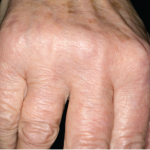In a small preliminary study, the novel MK2 inhibitor, CC-99677, was safe and well tolerated by healthy participants. With daily dosing, the agent sustained reductions of tumor necrosis factor alpha and other cytokines for 14 days.

Subcategories:Clinical Criteria/GuidelinesEthicsLegal UpdatesLegislation & AdvocacyMeeting ReportsResearch Rheum
The ACR/CHEST ILD Guidelines in Practice, a video
In collaboration with the American College of Chest Physicians, the ACR released two new comprehensive guidelines aimed at improving the screening, monitoring, and treatment of patients with interstitial lung disease (ILD) secondary to systemic autoimmune rheumatic diseases (SARDs). Recently, Sindhu R. Johnson, MD, PhD, professor of medicine at the University of Toronto, Canada, director of the Toronto Scleroderma Program and principal investigator for the guideline, and Elana J. Bernstein, MD, MSc, Florence Irving associate professor of medicine in the Division of Rheumatology at Columbia University, New York City, and co-first author, presented a webinar to talk about how the guidelines were developed and present some of the recommendations and their rationale: Watch the recording now!

In a small preliminary study, the novel MK2 inhibitor, CC-99677, was safe and well tolerated by healthy participants. With daily dosing, the agent sustained reductions of tumor necrosis factor alpha and other cytokines for 14 days.

After two years of special virtual sessions, the AMA House of Delegates will reconvene in person June 10–15. ACR representatives will focus on Medicare physician payment system reform, national drug shortages, funding the new Advanced Research Projects Agency for Health and more.

ACR and ARP members converged on Capitol Hill in May to urge lawmakers to support legislation related to workforce expansion and patient access to care following training sessions presented by ACR staff dedicated to legislative affairs.

Eaton et al. set out to describe the prevalence, incidence and progression of radiographic and symptomatic hand osteoarthritis (OA), and to evaluate differences according to age, sex, race and other risk factors.
With 290 cosponsors, ACR-supported legislation to streamline prior authorization in Medicare Advantage plans has met a support threshold that may allow the lead sponsor to force House action.

HLA-B27 may be a phenotypic expression of axial spondyloarthritis (SpA), according to a large international study. The study found patients with axial SpA who were positive for HLA-B27 had more severe radiographic damage than those who were negative for HLA-B27, and three quarters of study patients with ankylosis spondyloarthritis were HLA-B27 positive.

At my first Advocacy Leadership Conference as a member of the ACR’s Insurance Subcommittee, I discovered the power of stories from the clinic and how lawmakers value clinicians’ input on healthcare legislation.

More than 70 rheumatologists and rheumatology health professionals convened in Washington, D.C., to advocate on behalf of legislation that would reduce patients’ out-of-pocket drug costs and help grow America’s healthcare workforce.

Doebl et al. compared the effect of symptoms and the healthcare use of people with fibromyalgia with those who fulfilled the criteria for fibromyalgia but had not been diagnosed and those with chronic pain. They found patients diagnosed with fibromyalgia reported the poorest healthcare experiences and were more likely than other study participants to be unemployed due to health issues. Their findings reveal an urgent need exists for a model of care for patients with fibromyalgia.

McMahan et al. examined how abnormal gastrointestinal (GI) transit may contribute to GI severity and symptoms in patients with systemic sclerosis (SSc). About 90% of people with SSc have GI tract involvement, and understanding the connection between GI symptoms, their severity and abnormal GI transit may permit targeted therapeutic approaches for these patients.